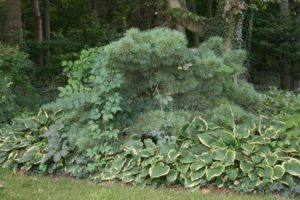Across the stream behind my late-boyhood home in Cascade, Michigan, there stretched a forest where hepaticas bloomed purple and pink in the spring, profusions of trilliums scattered like popcorn beneath the understory, and colonies of downy rattlesnake plantain and shining club moss nestled amid a sprawl of partridgeberry. A network of trails, known well to my feet, led up and down wooded hillsides, over streams, and across clearings past the stone ruins of pioneer homesteads, all the way to the banks of the Thornapple River a mile away.
In that forest, not far from my house, a tall old white pine stood sentinel on a hillock overlooking a tiny swamp. During the awkward and often painful years between twelve and eighteen, when a boy goes through his confusing transition to early manhood, that white pine became my friend.
It was a magnificent tree whose bark had long ago roughened from the gray slickness of a sapling to the brown, rugged furrows of a monarch. To say it was a wise old tree would be to impose too much on it. It was a tree. But it knew how to listen. And it knew how to welcome me to its sheltering shadow, where a circle of soft, fragrant needles spread like a blanket on the forest duff. There I could lay me down in the shade and silence, and look up through the branches at the clouds passing over, and smell the piney air, and simply be. I had a place to go and think and pray, and a great pine to talk to whose murmur in the breeze became all the reply and exactly the companionship I needed.
When life got difficult, as it often did, I would go to my friend the tree. It was always there. My place, my tree. My good friend. My beloved white pine.
In the spring of my eighteenth year, the sound of chain saws invaded the woods. Next came the bulldozers, and shortly after, the inevitable. There came an afternoon when I arrived home from school to find a massive strip of raw earth carved through the woods, down the hill to the edge of Trout Creek. The beautiful, tall tamaracks, which for years had lit the swamp like candle flames in the fall, had been thrust heedlessly aside. And sprawling in their shattered midst, its branches reaching skyward in mute supplication, lay my friend the white pine.
I dropped my books, ran across the homemade plywood bridge that spanned the creek, and rushed up the slope to where my pine tree lay. Tenderly I stroked its branches. And as golden pine pollen rose about me in a cloud, I wept. My friend—my dear, dear old friend. My heart is broken. I will miss you so!
Ten or twenty feet distant, just beyond the ruin of the bulldozer, I spotted a pine seedling, no more than a foot and a half tall. Undoubtedly it was the child of my giant white pine.
I recrossed the bridge, picked up my books, and headed to the house. In the garage, I grabbed a shovel. Then I headed back across the creek, and I dug up the tiny white pine, and I took it home and planted it in the side yard next to the garden.
That was more than forty years ago. My father died ten years later, my mother and sister moved to Grand Rapids, and in the ensuing years I have rarely visited the old neighborhood. But this evening I drove past the house on the corner of Tanglewood and Tricklewood Drives. It looks well kept, and the yard has filled in beautifully with trees. And there on the side, the white pine I planted long ago is growing still. I would like to say it has attained stately height and dimensions, but it appears that the homeowners have trimmed it so that it resembles a white pine bush rather than a tree. Nevertheless, it is vigorous, and I am satisfied that my old friend and confidant from decades past lives on in one of his progeny. The owners haven’t a clue as to the origins of their pine bush. But I do. I am part of the story.
My friend the white pine gave me his shade, his fragrance, his patient presence, and a place to talk to God and rest my teenage soul. In return, I gave my friend’s offspring a chance beyond the earthmovers that converted a noble forest into backyards where wild orchids no longer grow nor ruffed grouse drum in the spring.
I did it for the love of a tree. It was what I could do; it was the least I could do. And I am glad today to know that my small deed was not in vain. My friend’s lineage continues, and with me his memory remains, golden, like pine pollen rising as a cloud and glowing in the sun.

